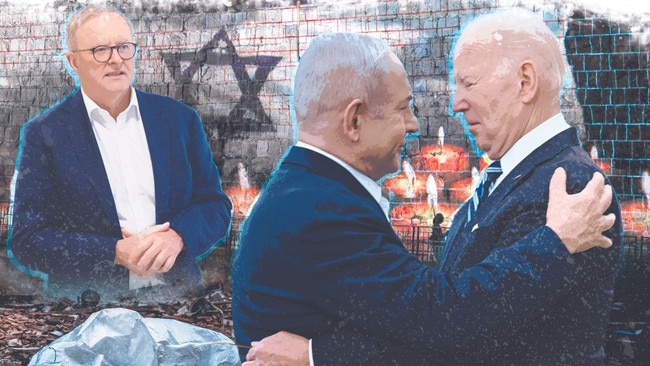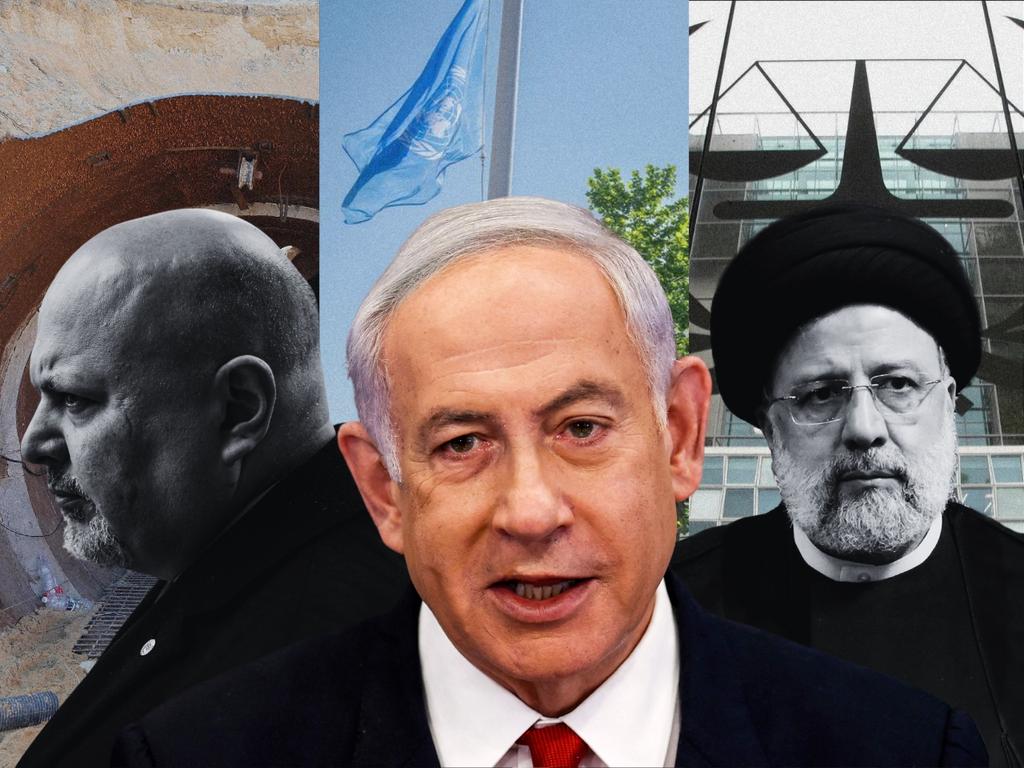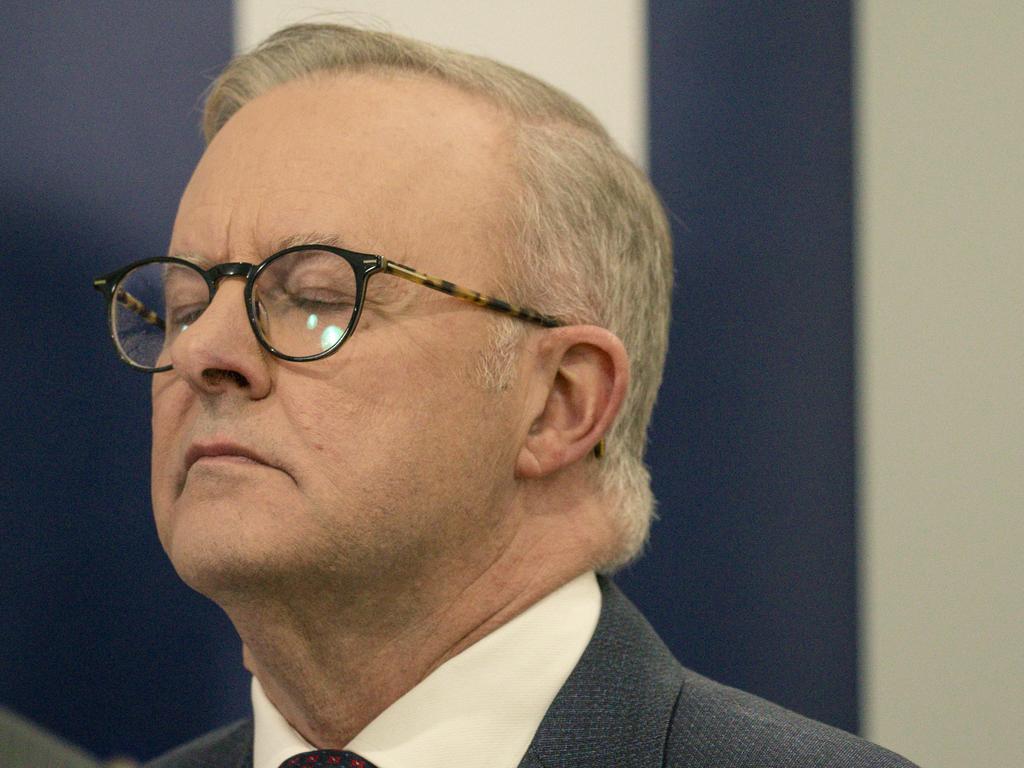In the dock: Israel or the ICC?
Amid the decline of international institutions, is Australia able to confront this tough reality or is it paralysed by domestic politics and weak leadership?

After being arrested Netanyahu – or Defence Minister Yoav Gallant – would be transported to the ICC’s detention centre in The Hague where bail might or might not be authorised. If the Albanese government failed to make the arrests such refusal would be seen to flout Australia’s legal obligations and universally would be seen as an undermining of the court by a Western nation.
The three Hamas terrorist leaders also the targets of the prosecutor – Yahya Sinwar, Mohammed Dief and Ismail Haniyeh – would have no problem with Australian authorities. As leaders of a terrorist organisation, they could not enter Australia.
The prosecutor’s action is historic and with vast implications. This is the first time the ICC has sought to prosecute the elected leaders of an established democracy and an ally of the US when that country was retaliating after an attack on its territory and its citizens.
This is a turning point in international law and attempts by lawyers to secure a utopian global order. It is designed to demonstrate the independence of the court and, by tying together the prosecutions of democratic Israel and a murderous terrorist organisation, puncture any notion that democracies possess an assumed immunity from being pursued for crimes against humanity.
In this sense it will be applauded by a majority of the 124 nations that are party to the Rome Statute of the International Criminal Court. Winston Churchill, Franklin Roosevelt and Harry Truman are lucky the ICC wasn’t around in 1944 and 1945 given their direct responsibility for the mass and targeted killings of civilians during World War II.
Khan is specific – while Israel has a right to defend itself that right “does not absolve Israel or any state” of ignoring international law since acts that “intentionally cause death, starvation, great suffering and serious injury to body or health of the civilian population – are criminal”.
Just wars and self-defence are not legally justified when they fail this test.
But the prosecutor has over-reached, raised grave questions about the ICC’s integrity and cast doubts on its relevance – neither the Israeli leaders nor the Hamas leaders are going to be arrested. The risk for the ICC is sinking into hollow gesture and institutional hypocrisy.
The prosecutor’s actions provoked a ferocious response from US President Joe Biden, criticism from British Prime Minister Rishi Sunak and confusion from the Albanese government, with ministers defending the court’s processes while Anthony Albanese refused to be drawn on the implications for Australia.
‘When you look at the practicality of what’s involved – the timing in my view was clearly political – that casts a serious question mark over the integrity and motivation of the prosecutor.’
Peter Dutton raised the prospect of Australia possibly leaving the ICC. The Opposition Leader told Inquirer: “The focus now is to get the request for arrest warrants for Israel’s leaders reversed. The integrity of the court’s processes are vital since one day the ADF might be before the ICC and if it is compromised or lacking in integrity could we have confidence our troops would get a fair trial?”
By his statement the prosecutor does immense moral damage to Israel – it is bracketed with a terrorist organisation in the joint application for arrest warrants. This decision is deliberate and political. The impression is devastating – it condemns Israel as a pariah state. Why were the applications tied together? What is the motive? Khan offers no legal reason.
Former ASIO, Defence Department and Department of Foreign Affairs and Trade boss Dennis Richardson told Inquirer: “This whole process raises the question of whether the prosecutor would have recommended arrest warrants for Hamas leaders if he had not come to this conclusion in relation to Israel.
“I think the prosecutor took a deliberate decision to delay any announcement relating to Hamas until such time as he was satisfied that he had a sufficient case to go forward against Israel.
“That ultimately is a political decision, not a legal decision. Putting the two together can only advantage Hamas and disadvantage Israel. It gives Hamas leaders almost the standing of statehood and it reduces Israel to the standing of a terrorist group.
“When you look at the practicality of what’s involved – the timing in my view was clearly political – that casts a serious question mark over the integrity and motivation of the prosecutor. This is going to raise challenges for the ICC and serious issues about its credibility.”
If the warrants are granted – and the threshold test is low – the risks to the ICC will be significant. The aspirations of many Western governments a generation ago in supporting the creation of the ICC will lie broken.
Former foreign minister Alexander Downer, who spearheaded Australia’s initial commitment to the court – eventually persuading a reluctant prime minister John Howard – said Khan had “destroyed” the court and if the warrants were authorised Australia should withdraw from the ICC.

Downer told Inquirer: “I am outraged by what the prosecutor has done because he has broken with the design of the ICC in two ways. First, he has politicised it by claiming he’s getting a balance between a terrorist organisation which massacred people and a duly established democratic government with an established judicial system. He draws no moral distinction between the two. That is absolutely outrageous.
“And secondly, he has abandoned the great protection relating to the ICC that it is a court of last resort. It applies where there is a breakdown of the domestic judicial system so that what is left is the international court. Now this doesn’t apply in Israel’s case, where it has a sophisticated judicial system. Karim Kahn hasn’t taken that into account. He shows an intention to destroy two of the basic tenets of the court – and these were protections for democratic countries. He’s destroying that.
“I think if the judges decide the prosecution of the Israeli leaders should proceed then Australia should withdraw altogether from the ICC and renounce our signatory of the statute.”
The messages from senior Labor ministers have been about upholding the court’s independence and its processes. That sounds conventional – but it’s not.
Such platitudes have consequences because Khan has left Western democracies with a dilemma. Upholding court processes means only one thing in this context – being willing to arrest Netanyahu. A nation cannot champion the court but deny its arrest warrants.
Of course, the arrests won’t happen for two reasons – Netanyahu won’t enter any danger zones and the notion of an Australian prime minister authorising his arrest – whether as Israeli Prime Minister or not – is politically untenable. If Netanyahu, somewhere or other, were arrested then attitudes towards the court would descend into meltdown. The US congress, in all probability, would impose sanctions against the court itself.
Where does the Albanese government stand? Sadly, the Prime Minister doesn’t seem to know. If Labor says it upholds the ICC’s processes, then it accepts its obligation to be willing to arrest Netanyahu and Gallant. That would cause uproar and polarise the country even as a theoretical proposition. It would brand Australia in the world. It would drive a deep wedge between Australia and Israel. It would become an act of immense political and moral import.
Netanyahu visited this country as Prime Minister in 2017 and was welcomed by prime minister, Malcolm Turnbull. What happens if there is a next time – straight to jail?
Richardson said: “In the theoretical scenario of Netanyahu coming to Australia I think it would be untenable for an Australian government to seek his arrest. That’s quite different to what views one might have about Netanyahu himself and his conduct over the last nine months.”
Yet any Albanese signal that he won’t accept the court’s obligations on Australia, or will equivocate, will ignite a firestorm from the left and bring damnation on his head as a hypocrite.
If you doubt this, read Khan’s log of accusations against Israel on which he claims he has evidence – it is a devastating indictment, an incendiary document that will be hung around Israel’s head forever and used by its enemies, the left in the Western democracies and the pro-Palestinian “from the river to the sea” activists to delegitimise the Israeli state.
Regardless of what one thinks of the prosecutor’s statement, the damage Netanyahu has done to Israel’s standing in the world is monumental.
Albanese wouldn’t criticise the prosecutor and he wouldn’t support the prosecutor. But that’s an untenable stance. Asked whether Australia should withdraw from the ICC he refused to answer.
The Prime Minister said Australia saw no equivalence between a terrorist organisation and Israel but said he didn’t comment on court proceedings.
In his indictment Khan accuses Israel of imposing a “total siege over Gaza”, closing the three border crossing points for extended periods, restricting transfer of food and medicines, cutting off cross-border water pipelines, cutting off electricity supplies, attacks on civilians including those queuing for food, attacks on and killing of aid workers – all such acts being part of a “common plan to use starvation as a method of war and other acts of violence against the Gazan civilian population” with three aims – to eliminate Hamas, to secure return of hostages and to “collectively punish” the civilian population “whom they perceive as a threat to Israel”.
Khan says he has evidence from multiple witnesses including doctors plus video, photo, audio and satellite imagery. He says the facts are widely known and reveal “starvation as a method of warfare” with the population suffering from malnutrition, dehydration, and deaths among babies and women.
He says Israel’s has “systematically and intentionally” deprived people of the objects to human survival and warns the crimes are continuing.
In a chaotic media conference on Thursday Albanese dismissed as “hypothetical” how Australia would react to confirmation of arrest warrants. Incredibly, he said Australia had signed up to the ICC under the Howard government when Downer was foreign minister so “it’s up to them, I think, to explain those decisions at the time”. Incredible.
“The ICC exists,” Albanese said. “They haven’t made a determination. They haven’t made a decision.”

In his long condemnation of Israel, Khan said: “No foot soldier, no commander, no civilian leader – no one – can act with impunity.” Given the force of his indictment, how can Khan survive in his role if the three-person judicial panel rejects his request for warrants? This issue is riddled with politics. How could the panel decide to prosecute the Hamas leaders but not the Israeli leaders?
The prosecutor and the court know many nations accuse Israel of war crimes and the pressure from international human rights lawyers that Israeli leaders be charged has been immense.
The global chasm opening up could be irreparable. President Biden said: “Let me be clear: whatever this prosecutor might imply, there is no equivalence – none – between Israel and Hamas. We will always stand with Israel against threats to its security.”
British Prime Minister Sunak said the prosecutor’s statement was “deeply unhelpful”, denied any “moral equivalence” between the two sides and said the actions “do absolutely nothing to get a pause in the fighting, to get the hostages out or aid into Gaza”.
The certainty is that those nations that refused to join the ICC – including the US, China, Russia, Iran, India, Indonesia and Turkey among others – will conclude their judgment was correct and their suspicion of a court trying to infringe their sovereignty was entirely justified.
The accusation that the prosecutor is motivated by politics has many arguments to sustain it.
In his article in this paper this week Australian National University emeritus professor Ramesh Thakur, like Downer, regretted his role as a senior UN official working for the establishment of the court.
“This is a grotesque inversion of international criminal justice,” Thakur said. “I never expected the ICC would be weaponised against democracies defending themselves against terrorists. There is no parallel between terrorists who target civilians to kill, main, rape and abduct and a professional and disciplined military.
“The allegation that Israel is deliberately starving civilians as a method of warfare is baseless. Israel has overseen the delivery of half a million tonnes of relief supplies to civilians in nearly 30,000 aid trucks.
“In contrast, Hamas steals and profiteers much of the aid.”
Khan’s indictment against Israel’s leaders fails to confront the central reality of the war – that Hamas hides behind the civilian population, uses the population as shields, and exploits as a weapon of propaganda war the inevitable civilian deaths from Israel’s efforts to eliminate Hamas as a military force – a project not going too well at present.
Hamas cannot be eliminated without a large number of civilian deaths. That is a known military reality, long established from many urban warfare campaigns.
Reinforcing Downer’s point about the ICC being a court only of “last resort”, Peter Wertheim, co-chief executive of the Executive Council of Australian Jewry, said the prosecutor’s request, by ignoring the proven record of Israeli courts “appears to violate one of the basic principles on which the ICC was established”.
The implication, moreover, is “that respected, independent courts of democratic countries including those of Australia, will not be trusted to act fairly and impartially in prosecuting crimes committed by their own country’s political and military leaders”.
As Richardson said, linking the requested arrest warrants involving Hamas and Israeli leaders invites a comparison that must damage Israel. It suggests, again, a prejudice against Israel in UN institutions and related international forums.
The bigger question was raised by Thakur: why should constitutional democracies allow the ICC any authorisation in their jurisdictions given the fatal combination of its political bias and its arbitrary discretions – witness its failure to investigate China’s crimes against Uighurs?
The sad conclusion is that amid the decline of international institutions, the ICC is at risk of a grievous act of self-harm. Is Australia able to confront this tough reality or is it paralysed by domestic politics and weak leadership?





Providing the International Criminal Court approves the arrest warrants sought by prosecutor Karim Khan, the Albanese government will be obliged to act as a signatory nation to the court and instruct our police to arrest Benjamin Netanyahu upon him entering Australia’s jurisdiction.